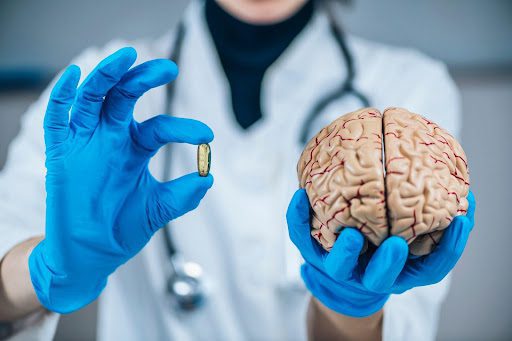The placebo effect is a powerful example of the mind’s healing influence on the body. An individual can benefit from a treatment, even one that has no recognized therapeutic properties. But how? The placebo effect has long been recognized as a factor in treatment settings, and researchers are starting to unravel the complexity behind it. While prescribing placebos as a treatment is not recommended, clinicians can learn to utilize the mechanisms behind the placebo effect to promote better treatment outcomes.
Read on to learn what the placebo effect is in mental health and examples of how it works. Then understand the role of the placebo effect in the treatment of depression and anxiety.
The placebo effect is a response to a non-active treatment and is most closely observed in the context of clinical research studies. However, it can occur any time an individual has positive expectations of an activity or treatment, even with no known therapeutic properties. Placebo response reflects the larger context of an individual’s response to treatment, carrying broader implications for positive therapeutic environments.

The placebo effect is an individual’s physiological response to an intervention due to their belief that it may be beneficial. It can be seen when a non-active substance, such as a sugar pill, is delivered as if it were an active treatment. Since no active therapeutic agent is used, the individual’s positive response is attributed directly to their expectations of the treatment itself. Their belief in the treatment’s potential is enough to result in perceived symptom improvement.
A placebo response refers to observed change resulting from an individual’s entire treatment experience. It includes the distinct placebo effect plus the broader context of treatment, such as an individual’s interaction with the provider, the clinical environment, cultural influences, and other factors. In situations where distress plays a larger part in symptomatology, the placebo effect may have a greater impact. This means a positive treatment response involves more than eliciting a biochemical reaction or following a research-based technique to the letter. A welcoming environment and supportive interactions with providers can also have a measurable therapeutic impact.
Researchers are still exploring how the placebo effect develops for some individuals, and it is believed that classical conditioning and positive expectations play a part.
Classical conditioning is a learning process that shapes behaviors and expectations, occurring when an individual associates a stimulus with a specific response. When an association is locked in through memories, it affects future expectations. If an individual recalls that their treatment experience with a specific provider or clinic was positive, they may have similar positive expectations when they engage with that provider in the future.
Individuals may also acquire positive expectations about a treatment through social learning, even with no prior experience. An example may be an individual being told that a specific treatment approach is often helpful, prompting positive expectations before treatment has begun. Their more optimistic state of mind may affect how they perceive their symptoms, thus resulting in a placebo effect.
Cognitive, emotional, and physical symptoms can be attributed to multiple conditions, making the impact of a placebo effect relevant for many health outcomes.
Open-Label Placebo Study: An open-label placebo study, where one group is clearly told they are getting a placebo, was done on back pain treatment. Over three weeks, one group was given back pain treatment as usual plus a daily placebo pill, and the other group was given treatment as usual with no placebo. The placebo group was educated about the placebo effect and openly told the placebo treatment contained no medication. At the end of the study, the placebo group reported more symptom improvement than the non-placebo group.
Individual Bias: An individual’s biases may positively influence treatment outcomes, even if an intervention has no known therapeutic impact for a specific disorder. For example, an individual who values the health benefits of herbal tea may benefit from having it prescribed as part of the treatment. A clinician may recommend psychiatric medications along with herbal tea to encourage adherence to the medication regimen. The tea may have no active ingredient that would impact symptoms, but it is unlikely to be harmful either. This approach ties the benefits of the medication treatment with the perceived benefits of herbal tea.

The placebo effect is a relevant treatment factor, and it does not come without some controversy. As researchers study the impact of the placebo effect, more is discovered about its potential and limitations in mental health treatment.
Multiple studies show that medication is slightly more effective at providing symptom relief than placebos. But some researchers have argued that the small advantage of medication is not clinically meaningful. In other words, a change that is not significant enough to be valued by the patient, clinician, or both. With an efficacy similar to a placebo effect, some individuals may understandably conclude that the benefits of taking medication are not worth the risk.
The question about placebos and medication efficacy is far from resolved, and medication is still helpful for some individuals. In the end, many treatment options offer some measure of safety and efficacy, and it is up to clinicians and patients to determine the best balance for the situation.
Given the similarities between the efficacy of the placebo effect and medication, the placebo effect appears to have potential as a safe and effective dimension of depression treatment. However, the potential impact of placebos seen in research studies is not necessarily transferable to a clinical treatment setting at this time, and here are some key reasons why.
Nonetheless, clinicians can still utilize the impact of positive expectations in treatment. Individuals with mild to moderate symptoms show the most pronounced placebo effect and may benefit the most from promoting positive expectations.
The placebo effect has played a significant role in mental health studies over the years, and researchers are digging deeper to understand its impact and potential. Can the placebo effect be taken out of the research lab and used in practical treatment settings? While prescribing placebo treatments may not be feasible, clinicians can learn to utilize the psychological mechanics behind the placebo effect where it can provide the most benefit.